
248 Results


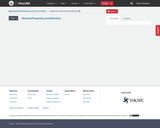



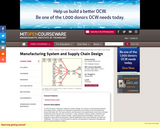
15.763 focuses on decision making for system design, as it arises in manufacturing systems and supply chains. Students are exposed to frameworks and models for structuring the key issues and trade-offs. The class presents and discusses new opportunities, issues and concepts introduced by the internet and e-commerce. It also introduces various models, methods and software tools for logistics network design, capacity planning and flexibility, make-buy, and integration with product development. Industry applications and cases illustrate concepts and challenges. Recommended for operations management concentrators. Second half-term subject.
- Subject:
- Applied Science
- Business and Finance
- Environmental Science
- Manufacturing
- Professional Studies
- Material Type:
- Full Course
- Provider:
- M.I.T.
- Provider Set:
- M.I.T. OpenCourseWare
- Author:
- Graves, Stephen
- Simchi-Levi, David
- Date Added:
- 01/01/2005
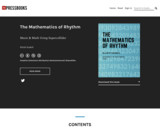
Using the free software Supercollider, you can create create music using computer coding. This text and lesson provide instructional videos, downloadable files, and step by step instructions for coding in the unique language.
- Subject:
- Applied Science
- Computer Science
- Electronic Technology
- Mathematics
- Professional Studies
- Material Type:
- Activity/Lab
- Author:
- Elliott Grabill
- Date Added:
- 05/10/2021
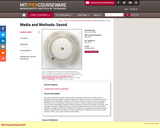
This course explores the ways in which humans experience the realm of sound and how perceptions and technologies of sound emerge from cultural, economic, and historical worlds. It examines how environmental, linguistic, and musical sounds are construed cross-culturally. It describes the rise of telephony, architectural acoustics, sound recording, and the globalized travel of these technologies. Students address questions of ownership, property, authorship, and copyright in the age of digital file sharing. There is a particular focus on how the sound/noise boundary is imagined, created and modeled across diverse sociocultural and scientific contexts. Auditory examples will be provided. Instruction and practice in written and oral communication provided. At MIT, this course is limited to 20 students.
- Subject:
- Arts and Humanities
- Cultural Studies
- Film and Music Production
- Professional Studies
- Material Type:
- Full Course
- Provider:
- M.I.T.
- Provider Set:
- M.I.T. OpenCourseWare
- Author:
- John Picker
- Date Added:
- 01/01/2012
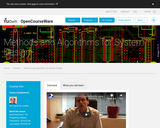
System design is the central topic of this course. We move beyond the methods developed in circuit design (although we shall have interest in those) and consider situations in which the functional behavior of a system is the first object under consideration.
- Subject:
- Electronic Technology
- Engineering
- Professional Studies
- Material Type:
- Activity/Lab
- Assessment
- Full Course
- Lecture Notes
- Reading
- Provider:
- Delft University of Technology
- Provider Set:
- Delft University OpenCourseWare
- Author:
- T.G.R.M. van Leuken
- Date Added:
- 05/22/2019
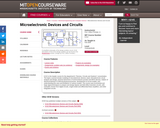
" 6.012 is the header course for the department's "Devices, Circuits and Systems" concentration. The topics covered include modeling of microelectronic devices, basic microelectronic circuit analysis and design, physical electronics of semiconductor junction and MOS devices, relation of electrical behavior to internal physical processes, development of circuit models, and understanding the uses and limitations of various models. The course uses incremental and large-signal techniques to analyze and design bipolar and field effect transistor circuits, with examples chosen from digital circuits, single-ended and differential linear amplifiers, and other integrated circuits."
- Subject:
- Electronic Technology
- Engineering
- Professional Studies
- Material Type:
- Full Course
- Provider:
- M.I.T.
- Provider Set:
- M.I.T. OpenCourseWare
- Author:
- Fonstad Jr, Clifton
- Date Added:
- 01/01/2009
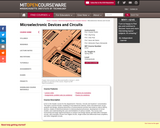
" 6.012 is the header course for the department's "Devices, Circuits and Systems" concentration. The topics covered include: modeling of microelectronic devices, basic microelectronic circuit analysis and design, physical electronics of semiconductor junction and metal-on-silicon (MOS) devices, relation of electrical behavior to internal physical processes, development of circuit models, and understanding the uses and limitations of various models. The course uses incremental and large-signal techniques to analyze and design bipolar and field effect transistor circuits, with examples chosen from digital circuits, single-ended and differential linear amplifiers, and other integrated circuits."
- Subject:
- Electronic Technology
- Engineering
- Professional Studies
- Material Type:
- Full Course
- Provider:
- M.I.T.
- Provider Set:
- M.I.T. OpenCourseWare
- Author:
- Hoyt, Judy
- Kong, Jing
- Sodini, Charles
- del Alamo, Jes
- Date Added:
- 01/01/2009
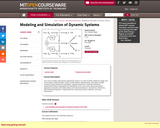
Mathematical modeling of complex engineering systems at a level of detail compatible with the design and implementation of modern control systems. Wave-like and diffusive energy transmission systems. Multiport energy storing fields and dissipative fields; consequences of symmetry and asymmetry. Nonlinear mechanics and canonical transformation theory. Examples will include mechanisms, electromechanical transducers, electronic systems, fluid systems, thermal systems, compressible flow processes, chemical processes. This course models multi-domain engineering systems at a level of detail suitable for design and control system implementation. Topics include network representation, state-space models; multi-port energy storage and dissipation, Legendre transforms; nonlinear mechanics, transformation theory, Lagrangian and Hamiltonian forms; and control-relevant properties. Application examples may include electro-mechanical transducers, mechanisms, electronics, fluid and thermal systems, compressible flow, chemical processes, diffusion, and wave transmission.
- Subject:
- Electronic Technology
- Professional Studies
- Material Type:
- Full Course
- Provider:
- M.I.T.
- Provider Set:
- M.I.T. OpenCourseWare
- Author:
- Hogan, Neville
- Date Added:
- 01/01/2006
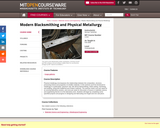
"Physical metallurgy encompasses the relationships between the composition, structure, processing history and properties of metallic materials. In this seminar you'll be introduced to metallurgy in a particularly "physical" way. We will do blacksmithing, metal casting, machining, and welding, using both traditional and modern methods. The seminar meets once per week for an evening laboratory session, and once per week for discussion of issues in materials science and engineering that tie in to the laboratory work. Students will begin by completing some specified projects and progress to designing and fabricating one forged and one cast piece."
- Subject:
- Physical Science
- Physics
- Professional Studies
- Material Type:
- Full Course
- Provider:
- M.I.T.
- Provider Set:
- M.I.T. OpenCourseWare
- Author:
- Tarkanian, Michael
- Date Added:
- 01/01/2008
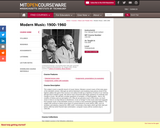
A survey of major works of the twentieth century, beginning with Mahler, Schoenberg, Stravinsky, Bartok, and Ives; continuing with Varese, Webern, Hindemith, Prokofiev, among other composers. A general view of the current scene. Description from course home page:This subject covers a specific branch of music history: Western concert music of first sixty years of the twentieth century. Although we will be listening to and studying many pieces (most of the highest caliber) the goal of the course is not solely to build up a repertory of works in our memory (though that is indeed a goal). We will be most concerned with larger questions of continuity and change in music. We will also consider questions of reception, or historiography - that is, the creation of history and our perception of it. Why do we perceive much of this music, so much closer in time to us than Mozart or Beethoven, to be so foreign? Is this music aloof and separate from popular music of the twentieth century or is there a real connection (perhaps hidden)? The subject will continue to follow some topics of central interest to music before 1960, such as serialism and aleatory, beyond the 1960 cutoff. Conversely a few topics which get their start just before 1960 but which flourish later (minimalism, computer music) will be covered only in 21M.263.
- Subject:
- Arts and Humanities
- Film and Music Production
- Professional Studies
- Material Type:
- Full Course
- Provider:
- M.I.T.
- Provider Set:
- M.I.T. OpenCourseWare
- Author:
- Cuthbert, Michael
- Date Added:
- 01/01/2006
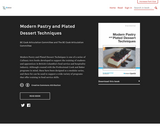
Modern Pastry and Plated Dessert Techniques is one of a series of Culinary Arts books developed to support the training of students and apprentices in British Columbia’s food service and hospitality industry. Although created with the Professional Cook and Baker programs in mind, these have been designed as a modular series, and there for can be used to support a wide variety of programs that offer training in food service skills.
- Subject:
- Professional Studies
- Material Type:
- Textbook
- Provider:
- BCcampus
- Provider Set:
- BCcampus Open Textbooks
- Author:
- BC Cook Articulation Committee
- Date Added:
- 01/01/2015
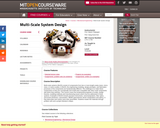
Multi-scale systems differ from traditional macro-scale systems in that the multi-scale systems use components from two or more scales (i.e. nano, micro, meso, and macro-scales). Subject provides the skills required to design and manufacture multi-scale systems. Emphasis is placed on understanding the fundamental differences between traditional macro-scale system design and the design of multi-scale systems. Topics include design methodologies, modeling approaches, analytic tools, and manufacturing processes. Examples drawn from a diverse range of applications, including automobiles, fiber optic equipment, electronic test equipment, and micro/meso-scale machinery. Students master the materials through problem sets and a substantial term project.
- Subject:
- Manufacturing
- Professional Studies
- Material Type:
- Full Course
- Provider:
- M.I.T.
- Provider Set:
- M.I.T. OpenCourseWare
- Author:
- Culpepper, Martin
- Date Added:
- 01/01/2004
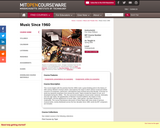
Begins with the premise that the 1960s mark a great dividing point in the history of twentieth-century Western musical culture, and explores the ways in which various social and artistic concerns of composers, performers, and listeners have evolved since that decade. Focuses on works by classical composers from around the world. Topics to be explored include: the impact of rock, as it developed during the 1960s-70s; the concurrent emergence of post-serial, neo-tonal, Minimalist, and New Age styles; the globalization of Western musical traditions; the impact of new technologies; and the significance of music video, video games, and other versions of (digital) multimedia. Interweaves discussion of these topics with close study of seminal musical works, evenly distributed across the four decades since 1960. Works by MIT composers included.
- Subject:
- Arts and Humanities
- Cultural Studies
- Film and Music Production
- Professional Studies
- Material Type:
- Full Course
- Provider:
- M.I.T.
- Provider Set:
- M.I.T. OpenCourseWare
- Author:
- Robison, Brian
- Date Added:
- 01/01/2006
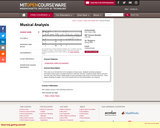
An introduction to the analysis of tonal music. Students develop analytical techniques based upon concepts learned in Harmony and Counterpoint I and II. Students study harmony, counterpoint, melodic line and motivic relationships at local and large scale levels of musical structure. Three 7-page papers, one revised paper, and one oral presentation required.
- Subject:
- Arts and Humanities
- Film and Music Production
- Professional Studies
- Material Type:
- Full Course
- Provider:
- M.I.T.
- Provider Set:
- M.I.T. OpenCourseWare
- Author:
- Child, Peter
- Date Added:
- 01/01/2008
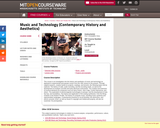
"This course is an investigation into the history and aesthetics of music and technology as deployed in experimental and popular musics from the 19th century to the present. Through original research, creative hands-on projects, readings, and lectures, the following topics will be explored. The history of radio, audio recording, and the recording studio, as well as the development of musique concr?te and early electronic instruments. The creation and extension of musical interfaces by composers such as Harry Partch, John Cage, Conlon Nancarrow, and others. The exploration of electromagnetic technologies in pickups, and the development of dub, hip-hop, and turntablism. The history and application of the analog synthesizer, from the Moog modular to the Roland TR-808. The history of computer music, including music synthesis and representation languages. Contemporary practices in circuit bending, live electronics, and electro-acoustic music, as well as issues in copyright and intellectual property, will also be examined. No prerequisites."
- Subject:
- Arts and Humanities
- Film and Music Production
- Professional Studies
- Material Type:
- Full Course
- Provider:
- M.I.T.
- Provider Set:
- M.I.T. OpenCourseWare
- Author:
- Ariza, Christopher
- Date Added:
- 01/01/2009